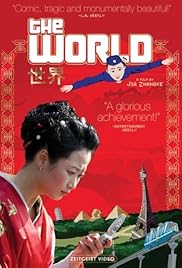WORLD, THE (SHIJIE)
(director/writer: Jia Zhangke; cinematographer: Nelson Yu Lik-wai; editor: Jing Lei Kong; music: Giong Lim; cast: Zhao Tao (Tao), Chen Taisheng (Taisheng), Jing Jue (Wei), Jiang Zhong-wei (Niu), Wang Yi-qun (Qun), Liang Jingtong (Tao’s ex-boyfriend), Xiang Wan (Youyou), Shuai Ji (Erxiao), Alla Shcherbakova (Anna), Xiaoshuai Wang (Prostitute client); Runtime: 136; MPAA Rating: NR; producers: Keung Chow/Shozo Ichiyama/Hengameh Panahi/Zhong-lun Ren/Takio Yoshida; Zeitgeist; 2004-China-in Mandarin with English subtitles)
“Gives one a rough idea about the Chinese Dream through its modern day landscape and relating the new China to the hopes and aspirations of its young citizens.”
Reviewed by Dennis Schwartz
The 35-year-old maverick director-writer Jia Zhangke (“Unknown Pleasures”/”The Platform”/”Xiao Wu”) shoots his first state supported film approved by the Chinese authorities and his first in a major city. Jia makes it a glossy visual feast depicting China’s concern to be part of the world’s market capitalism and for its cities to be contemporary, and also throws in a twisty psychological fictional romantic soap opera story among the workers in the film’s metaphorical theme park presentation (an attempt to bring a Disney theme park look into China). It’s diverting, probing, very watchable and gives one a rough idea about the Chinese Dream through its modern day landscape and relating the new China to the hopes and aspirations of its young citizens. Jia’s construction of a sprawling Beijing World Theme Park (which is the name of the real theme park outside Beijing) contains on a 115-acre park site replicas of the Eiffel Tower, London Bridge, the World Trade Center, the Leaning Tower of Pisa, the Taj Mahal, the Great Pyramids, St. Peter’s Basilica and a hundred more such replicas. The park has a boastful slogan that states “See the world without ever leaving Beijing.” But Jia skewers such optimistic visions for China by showing a group of young park workers and the despair that underlies their new prosperity through globalization and the artificial plastic world they live in (causing them loss of their identities).
Tao (Zhao Tao) is a young dancer in the park who is thrilled to be working in such an exotic setting, as her life revolves around the workplace complex. She came here from the provinces, the small northern rural Chinese town of Fenyang in the backwater Shanxi region, and is dating Taisheng (Chen Taisheng). He’s an ambitious but inarticulate security guard at the park who is also from her hometown in Shanxi. Both are thriving in this richer environment, and are better off than most other Shanxi arrivals who work as laborers for very low pay (the reason China’s globalization efforts are so prosperous). The couple are in a fragile relationship, as the pretty virgin won’t put out for Taisheng and he’s insecure that she’ll dump him for another. Which causes him to go after factory supervisor Qun (Wang Yi-qun), a married woman who creates cheap knockoffs of western designer fashions and is planning to emigrate. Meanwhile Tao is pressured to be a prostitute by her bosses, and befriends a visiting Russian girl (Alla Shcherbakova) working in the park as a hostess and whose passport is being held by her handler so that she can be lured into prostitution. They both don’t speak the other’s language but still communicate with each other over their woman problems.
The film’s stark metaphorical message has its innocent heroine in recurring shots riding the park monorail that only travels around in circles. Jia’s ironic metaphor has a caveat for China’s global economy, that there are danger signs because the recent economic boom has been carried on the backs of the underpaid workers.
Filled with colorful kitsch showbiz sequences at the park, characters whose lives are troubled over rotten relationships, animated adventures that grow out of personal text messages sent via cell phones, and petty jealousies that keep the workers divided, the film uses the personal text messages on the cell phones (it seems every young person in China has a cell phone) to relay the hopes and dreams of the park workers who all came to the big city for a brighter future and are confused because they are faced with so many contradictions (such as China’s globalization but at the same time is isolated from the world over humanitarian abuses) that entrap them in China’s maddening new prosperity.
At times it’s a majestic presentation, at other times it seems unfocused, overlong, offering only a touristy look at China and is saddled with an awkward ending. But overall it’s a somewhat compelling look at a very talented Chinese filmmaker’s dispiriting depiction of China’s new generation of dreamers who have the illusions of material wealth and a glamorous showbiz culture dangled before their hungry eyes and like the filmmaker feel trapped and do not know what to do.

REVIEWED ON 9/12/2008 GRADE: B+